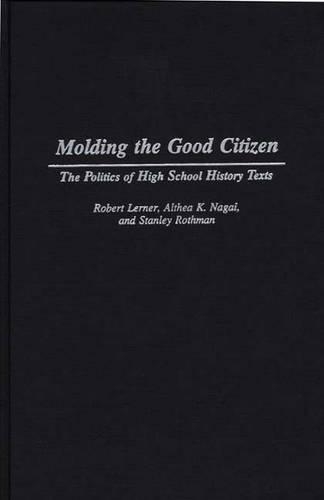
Molding the Good Citizen: The Politics of High School History Texts
(Hardback)
Publishing Details
Molding the Good Citizen: The Politics of High School History Texts
By (Author) Stanley Rothman
Bloomsbury Publishing PLC
Praeger Publishers Inc
23rd March 1995
United States
Classifications
Tertiary Education
Non Fiction
Human rights, civil rights
Political ideologies and movements
907.1273
Physical Properties
Hardback
200
Description
A series of culture wars are being fought in America today; Lerner, Nagai, and Rothman contend that one key battleground is the nation's high school texts. The authors argue that today's textbook controversies, as exemplified in the proposed National Standards for the Study of United States and World History, reflect changes in American public philosophy and the education profession. Conventional wisdom among students of the curriculum is that the major threat to freedom of the schools comes from the religious right. While this may have been true at one time, Lerner, Nagai, and Rothman assert that the major thrust today involves the imposition on schools of the ideology of particular groups that seek to use education as a mechanism for changing society. They document the growing influence of these groups, and their supporters among educators, through an extensive quantitative content analysis of leading high school history texts over the past 40 years and a historical analysis of how this outlook and the willingness to impose it became part of educators' conventional wisdom. The authors document the growing influence of these groups, and their supporters among educators, in two ways. First, they present an extensive quantitative content analysis of leading high school history texts over the past 40 years, demonstrating in detail the feminist and multicultural perspectives that have come to dominate them. Second, they provide a historical analysis of how this outlook and the willingness to impose it became part of educators' conventional wisdom, tracing current policies back to the influence of the Progressive education movement led by John Dewey. This controversial book will be of exceptional interest to the general public as well as to researchers and students of education, public policy, and American intellectual history.
Reviews
"A crucial book for anyone who wants to understand why textbooks are like they are and how they got that way."-Lynne V. Cheney W.H. Brady, Jr. Distinguished Fellow, American Enterprise Institute Former Chairman of National Endowment for the Humanities
"A fascinating, original, and important analysis of the way that young Americans learn about the history of their nation. This is a book that should be read by parents, educators, legislators, and school board members. We are not likely to have informed citizenship unless we become aware of the ideas, attitudes, and biases that are lodged in our children's textbooks. Lerner, Nagai, and Rothman have done an excellent job of demonstrating the way that textbooks change in response to political pressures of their time."-Diane Ravitch Senior Research Scholar, New York University Former Assistant U.S. Secretary of Education
"An important study of American high school history textbooks, a subject around which there has been a great deal of controversy in recent years. Its particular value is that it not only tells us how the treatment of American history has changed in the last few decades, but it also goes into the forces that have been responsible for these changes, and how they influence textbook publishers. Everyone concerned with how and what young Americans are learning about their country will find this book invaluable."-Nathan Glazer Professor of Education and Sociology Emeritus Harvard University
"Molding the Good Citizen is an empirical, even-handed, and comprehensive study of the growing--and alarming--politicization of our nation's high school curricula. This is a good book for those who care about American history, American education, and what our children are being taught."-William J. Bennett Codirector, Empower America Former U.S. Secretary of Education
"This powerful analysis could not be timelier or more helpful in illuminating the continuing battles over the history curriculum--and the increasing control wielded by "radical progressives" over what our children learn in school. The recent uproar over national history standards is far clearer--and more worrying--within the context provided by this splendid book."-Chester E. Finn, Jr. John M. Olin Fellow, Hudson Institute Co-chair, Educational Excellence Network Former Assistant U.S. Secretary of Education
"Through painstaking research and statistical analysis, the authors demonstrate that history textbooks have maintained a negative view of corporate capitalism and the 'robber barons, ' while bowing to feminism and left-wing black politics by overstating the importance of [some] historical figures....We are fortunate to have Molding the Good Citizen to point out the problems [with these texts]."-National Review
Through painstaking research and statistical analysis, the authors demonstrate that history textbooks have maintained a negative view of corporate capitalism and the 'robber barons, ' while bowing to feminism and left-wing black politics by overstating the importance of [some] historical figures....We are fortunate to have Molding the Good Citizen to point out the problems [with these texts].-National Review
Author Bio
ROBERT LERNER is a Center Fellow at the Center for the Study of Social and Political Change at Smith College. ALTHEA K. NAGAI is a Center Fellow at the Center for the Study of Social and Political Change at Smith College. STANLEY ROTHMAN is Director of the Center for the Study of Social and Political Change at Smith College. Among their earlier collaborative works is Giving for Social Change: Foundations, Public Policy, and the American Political Agenda (Praeger, 1994).
